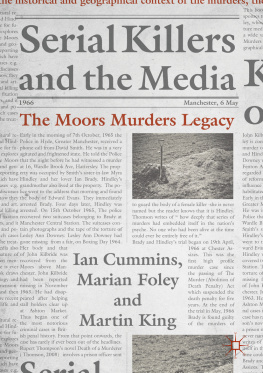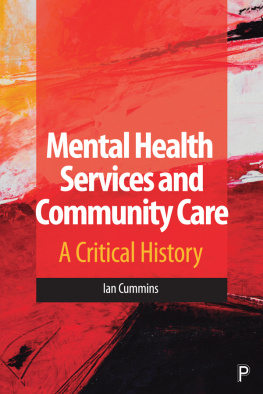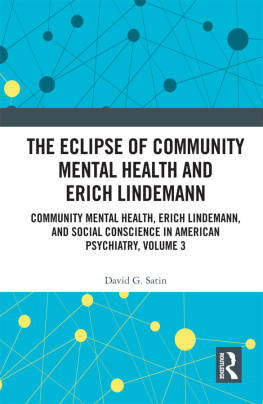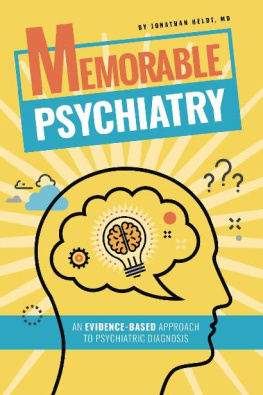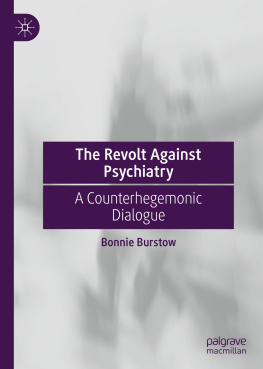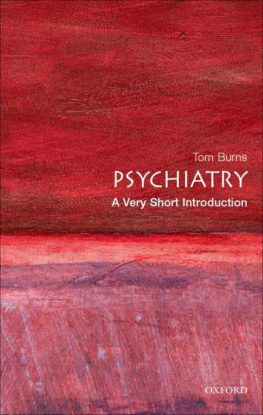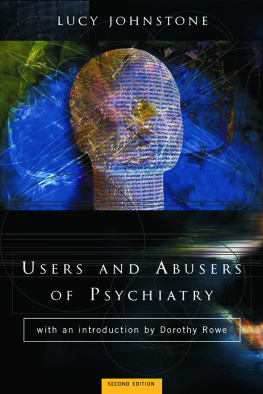CRITICAL
PSYCHIATRY
A BIOGRAPHY
Other books you may be interested in:
Anti-racism in Social Work Practice
Edited by Angie Bartoli ISBN 978-1-909330-13-9
Mental Health and the Criminal Justice System
By Ian Cummins ISBN 978-1-910391-90-7
Modern Mental Health: Critical Perspectives on Psychiatric Practice
Edited by Steven Walker ISBN 978-1-909330-53-5
Observing Children and Families: Beyond the Surface
By Gill Butler ISBN 978-1-910391-62-4
Psychosocial and Relationship-based Practice
By Claudia Megele ISBN 978-1-909682-97-9
Social Media and Social Work Education
Edited by Joanne Westwood ISBN 978-1-909682-57-3
Understanding Substance Use: Policy and Practice
By Elaine Arnull ISBN 978-1-909330-93-1
Whats Your Problem? Making Sense of Social Problems and the Policy Process
By Stuart Connor ISBN 978-1-909330-49-8
Critiquing Personality Disorder: A Social Perspective
By Julia Warrener ISBN 978-1-909330-81-8
Titles are also available in a range of electronic formats. To order please go to our website www.criticalpublishing.com or contact our distributor NBN International, 10 Thornbury Road, Plymouth PL6 7PP, telephone 01752 202301 or email orders@nbninternational.com
CRITICAL
PSYCHIATRY
A BIOGRAPHY
Ian Cummins
First published in 2017 by Critical Publishing Ltd
All rights reserved. No part of this publication may be reproduced, stored in a retrieval system, or transmitted in any form or by any means, electronic, mechanical, photocopying, recording or otherwise, without prior permission in writing from the publisher.
Copyright 2017 Ian Cummins
British Library Cataloguing in Publication Data
A CIP record for this book is available from the British Library
ISBN: 978-1-911106-60-9
This book is also available in the following e-book formats:
MOBI ISBN: 978-1-911106-61-6
EPUB ISBN: 978-1-911106-62-3
Adobe e-book ISBN: 978-1-911106-63-0
The rights of Ian Cummins be identified as the Author of this work have been asserted by him in accordance with the Copyright, Design and Patents Act 1988.
Cover design by Out of House
Text design by Greensplash Limited
Project management by Out of House Publishing
Print managed and manufactured by Jellyfish Solutions
Critical Publishing
3 Connaught Road
St AlbansAL3 5RX
www.criticalpublishing.com
For Marilyn, Nelson and Elliot with love
CONTENTS
Meet the author
Ian Cummins is a Senior Lecturer in Social Work at Salford University. He worked as a probation officer and mental health social worker before taking up academic posts. He has written extensively on mental health issues in the criminal justice system and the development of mental health policy.
Acknowledgements
I would like to thank the following friends and colleagues who have been a consistent source of support while I have been working on this project: Janet Chapman, David Edmondson, Marian Foley, Jameel Hadi, Martin King, Jane Lucas, Bernard Melling, Lisa Morriss, Emma Palmer, Kate Parkinson, Donna Peach, Sarah Pollock, Barry Schilling and Jonathan Simon.
Virtual support came from @asifamhp @SchrebersSister @Mental_Elf @JoWarner01 @Hannah_Bows @AkwugoEmejulu.
I owe a huge debt to my sisters, brother and late mother for their love and support. My mother loved books and I hope that she would have enjoyed this one.
Introduction
The obvious question to ask is why should we examine the work of this group of thinkers whose main works were published in the early 1960s surely the arcane debates from that period have little if any relevance to modern mental health services or the social work role within it? The answer to that question can be divided into two parts. The first is that writers and thinkers such as Basaglia, Goffman and Foucault produced work of such complexity that it is always worth revisiting as their insights can be helpful to our understanding of the present. The second reason is that the work that is considered here has played a key role in our attitudes to mental illness and mental health services. The roots of community care are complex we need to examine a range of factors including social attitudes, economics, and the discovery of new medicines and techniques. Within that complex and often seemingly contradictory narrative, works such as Asylums, The Myth of Mental Illness, The Bell Jar and Folie et draison: Histoire de la folie lge classique have been pivotal in shaping and shifting debates. The approach taken here is not to write a history of critical perspectives on psychiatry. Instead, I examine the key ideas of a range of thinkers, highlighting their key messages and ideas. In particular, I seek to identify those themes that are most relevant for contemporary mental health services.
CRITICAL PSYCHIATRY OR ANTI-PSYCHIATRY
The title of this volume reflects the debates about the use of the term anti-psychiatry. As Scull notes, the term anti-psychiatry came to be used for a wide range of thinkers as discussed here, Szasz and Laing, apart from both being psychiatrists have little if anything in common intellectually or politically. Scull concludes that anti-psychiatry was:
a confused and inchoate movement that somehow encompassed: a Glaswegian guru and self-professed man of the left; a US professor of psychiatry who declared mental illness was a myth and fulminated against socialism and collectivism (Szasz, 1961); a student of asylums who dubbed them total institutions, a category that for him included concentration camps (Goffman, ); a disaffected French philosopher masquerading as a historian (Foucault, 1965); and a variety of radical sociologists, including, so some allege, the author of this paper.
(Scull, , p 403)
I have used the term critical psychiatry as I feel that it captures more effectively the areas that are examined here. Debates about the use of terminology can deflect from consideration of the most important ideas within the work examined here. Anti-psychiatry was never a term that these writers were happy to use. It also gives the somewhat false impression that this was a movement.
PSYCHIATRY AND THE COUNTERCULTURE
The writers whose work is examined here, such as Foucault and Goffman, are among the most cited in the humanities and social sciences. Their influence has been profound and shows no sign of diminishing. One of the most interesting aspects of their oeuvre is that major works were concerned with the problems of societal response to mental illness. Their analysis can form the basis for approaches to a whole range of issues in Foucaults case there appears to be no end to the areas in which scholars use his work as a starting point for analysis. I would argue that this reflects not only the power of these scholars work but also the fact that responses to mental illness were seen as representative of much broader social issues. This political and social concern with mental illness seems to have somewhat dissipated. Mental health policy is far more likely to be presented and debated in technocratic and bureaucratic terms than as a fundamental issue of human and civil rights. One of the key messages of critical psychiatry is that these issues must be seen in terms of civil rights. They involve not only symbolic violence against a potentially marginalised group but also the use of compulsory treatment. The issues that were of concern to Fanon, Goffman and Szasz are still ones that can be found in modern form in our mental health services.


